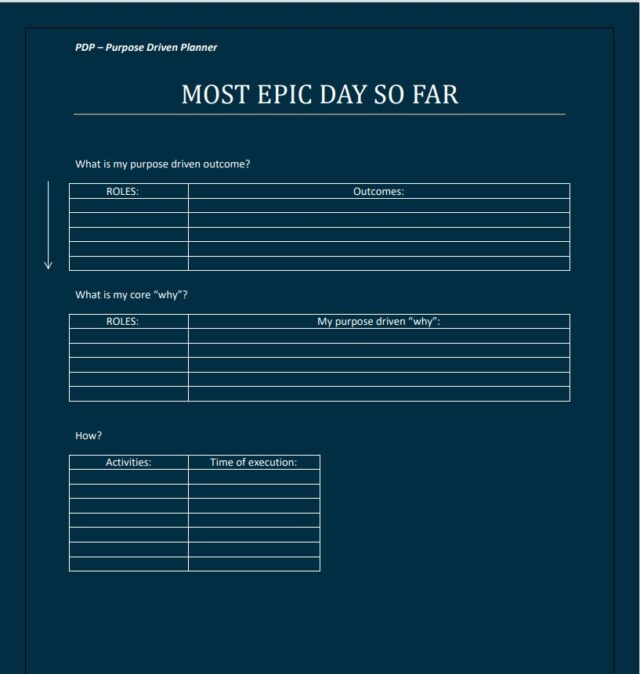“Every minute in planning saves 10 minutes in execution.” Brian Tracy
Before applying this principle, I learned from Brian Tracy, I was always rushing it. I developed a workaholic mentality which was not doing me any good, and thus I didn’t take any time for planning; I only wrote down fast what I should do and executed after that.
By having this quote in mind throughout the entire sequence of blog posts, not only will you not jump into mindless action right away, but you will take your time and strategically plan out your day for achieving the highest effectiveness and joy out of your day.
I am also the type of guy that is not fixated on one thing. I always tried to balance multiple activities in my life, and while at times hard, it got me to this point, so I can teach you how to do it as
well. The main mistake I made while trying to juggle multiple activities is that I didn’t set clearly defined roles for my life, so that is what we’re going to do now.
Before planning out my day based on my purpose-driven roles, something was always lagging. I was maybe doing good in college or on Youtube, but my relationship with my family was suffering. And why? Because I never put a family member’s role in my planner, I always let that one slide and gave it to chance.
From my practice, through trial and error, I figured that defining 5 roles is the magic number when it comes to planning. More than that might come off as overwhelming and less, you’re probably
leaving something out, whether it’s your family, friends, health, working out, etc. What I want you to do now is define for yourself your top 5 purpose-driven roles. These will be crucial for planning that’s ahead.
My top 5 purpose-driven roles:
________________________________________________
________________________________________________
________________________________________________
________________________________________________
________________________________________________
My current roles are Perficient technical consultant, family member, fitness and health enthusiast, college student, fitness and self-development Youtuber.
What is also very important before planning out your day is to think about the hierarchy of these roles. You don’t want to leave that to chance either. And that will vary, sometimes at the top of
the hierarchy will be family, college if it’s exam time, but the key is not to feel guilty about not focusing as much on some role because you realize that it’s not currently with the highest hierarchy of importance.
Before applying this, I always had trouble with it. Always feeling guilty about some aspect of my life not being looked at enough.
Also, keep in mind that as time passes, your roles might change. You’re not stuck with the ones you define now for the rest of your life.
Alright, now that you’ve clearly defined your key purpose-driven roles in your life, it’s time to show you a whole new concept of planning. I learned this from Tony Robbins, and it truly revolutionized
my life.
Instead of a to-do list, which is only focused on the “how,” here we are first starting off with the question for each of your roles, and that is: “What is my purpose-driven outcome?”
Let me share a short story on why this is so important, to define for each and every single one of your tasks, meetings, hang-outs, chores… a clear outcome.
Before knowing my outcome and only planning on the “how” part, I remember seeing on my to-do list: “video editing.” This one video took me a month to post on Youtube because I didn’t know my outcome, I got caught up in work, and I was actively procrastinating without finishing it for quite some time.
Instead of that, if I had a firm outcome in my head for the current day: “Make a 10 minute Youtube video”, everything would be different, and I would post a video in one day instead of
postponing it and getting caught up in the work instead of the target. Make your outcome as specific as possible!
Another reason why this is so good is that you can truly track your progress. Things such as study, edit a video, workout, and so on are very vague and hard to track your progress with. By knowing your outcome, on the other hand, you won’t steer of your path and know when the result is achieved.
Next-up is your “why” for each of your outcomes. I know you’re thinking to yourself that this takes longer but remember the quote at the beginning: “Every minute in planning saves 10 minutes in execution!”
This is crucial, and as you continue along with this blog series, you will know your “why” to your core, based on your needs, the things you truly want, not what society implanted in your head.
For now, you’re stuck with your current understanding of your “why” behind the things you do.
It’s so important to remind yourself why you’re doing what you’re doing because you can easily steer off the path and get lost. I’ve been there countless times. Getting lost in the execution part and completely forgetting why I’m even doing the things I’m doing.
With this, you’ll never get lost, so now I want you to write down your “why” behind every one of your outcomes. Why do you want them achieved?
Having this done, now we are at a point where you’ll write down your how and time of execution if needed.
Here’s the beauty of this planner, your “how” can change multiple times as you go throughout your day. Because you have firmly set outcomes, you can change your how as you go along.
Something might come up, so you’ll have to postpone your planned how and think of a different way to achieve your desired outcome.
Your planner should look something like this:

See you in one of the next posts! Have a great day!

